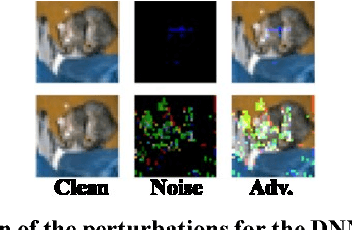Hammad Tariq
SSCNets: A Selective Sobel Convolution-based Technique to Enhance the Robustness of Deep Neural Networks against Security Attacks
Nov 04, 2018



Abstract:Recent studies have shown that slight perturbations in the input data can significantly affect the robustness of Deep Neural Networks (DNNs), leading to misclassification and confidence reduction. In this paper, we introduce a novel technique based on the Selective Sobel Convolution (SSC) operation in the training loop, that increases the robustness of a given DNN by allowing it to learn important edges in the input in a controlled fashion. This is achieved by introducing a trainable parameter, which acts as a threshold for eliminating the weaker edges. We validate our technique against the attacks of Cleverhans library on Convolutional DNNs against adversarial attacks. Our experimental results on the MNIST and CIFAR10 datasets illustrate that this controlled learning considerably increases the accuracy of the DNNs by 1.53% even when subjected to adversarial attacks.
QuSecNets: Quantization-based Defense Mechanism for Securing Deep Neural Network against Adversarial Attacks
Nov 04, 2018



Abstract:Deep Neural Networks (DNNs) have recently been shown vulnerable to adversarial attacks in which the input examples are perturbed to fool these DNNs towards confidence reduction and (targeted or random) misclassification. In this paper, we demonstrate that how an efficient quantization technique can be leveraged to increase the robustness of a given DNN against adversarial attacks. We present two quantization-based defense mechanisms, namely Constant Quantization (CQ) and Variable Quantization (VQ), applied at the input to increase the robustness of DNNs. In CQ, the intensity of the input pixel is quantized according to the number of quantization levels. While in VQ, the quantization levels are recursively updated during the training phase, thereby providing a stronger defense mechanism. We apply our techniques on the Convolutional Neural Networks (CNNs, a particular type of DNN which is heavily used in vision-based applications) against adversarial attacks from the open-source Cleverhans library. Our experimental results show 1%-5% increase in the adversarial accuracy for MNIST and 0%-2.4% increase in the adversarial accuracy for CIFAR10.
 Add to Chrome
Add to Chrome Add to Firefox
Add to Firefox Add to Edge
Add to Edge